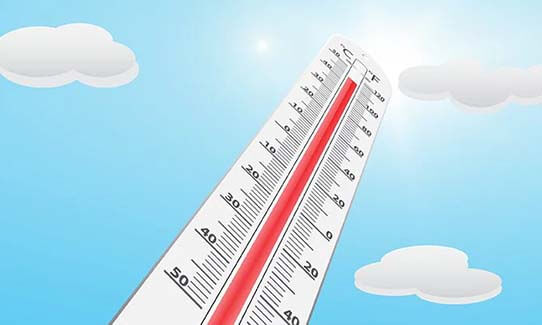

Jun 20 2022
Beware of the Heat


Summary
With soaring temperatures, outdoor activities can be can be hazardous or even fatal. Protect yourself and those around you from the heat.
With temperatures soaring above the century mark and heat indices in the danger zone, outdoor activities can be hazardous or even fatal.
Heat illness occurs when the body loses water and electrolytes through heavy sweating from exposure to heat and/or heavy exercise.
Prevent Problems
Dehydration is an obvious cause of heat illness. Fluid loss from exercise/sweating can be as much as 2 quarts or 4 pounds/hour or more, particularly in humid environments. Dehydration results in thickening of blood, making the heart work harder.
A quick way to determine your hydration status is to check the color of your urine. A well-hydrated individual will have clear, light-colored urine; dark golden colored urine is a sign of dehydration.
The most obvious way to rehydrate is to drink water or sports drinks containing electrolytes. Don’t wait until you’re thirsty; once you become thirsty, you’re already dehydrated.
Avoid alcoholic beverages and drinks that contain caffeine such as sodas, tea, coffee and energy drinks as they are counterproductive to hydration efforts. Eat a well-balanced diet (including breakfast) to replenish key nutrients that are lost through sweat. Even though your appetite may be diminished during extreme temperatures, you must fuel your body.
Fruits, vegetables, carbohydrates and proteins provide your body with life-sustaining nutrients. Get a good night’s sleep as rest allows your body to recuperate from the demands placed upon it.
If you must be outside during these temperatures, use common sense and listen to your body.
Try to do the most demanding work early in the morning, take frequent breaks (in the shade or air conditioning if available), drink appropriate fluids, wear light-colored clothing and re-fuel your body.
Some individuals will still be susceptible to heat illness. Individuals who have a history of heat problems are more likely to have recurring issues. Certain medications and supplements can also adversely affect the body’s ability to maintain adequate hydration and affect regulation of body temperature.
Watch for Signs
It’s important to recognize the early signs and symptoms of heat illness—extreme thirst, dry mouth, headache, dizziness, excessive fatigue, nausea, irritability, decreased performance and muscle cramps.
Heat Cramps
Usually heat cramps are limited to the legs and can be managed by stopping the activity, increasing fluids and electrolytes, and stretching and/or icing the involved muscles. In more severe cases, muscle cramps can progress to the back or even full-body cramps, which require IV fluids.
Heat Exhaustion
With continued dehydration, electrolyte imbalances and energy depletion, heat cramps can lead to heat exhaustion. Watch for profuse sweating with pale, cool clammy skin; chills; nausea and vomiting; and hyperventilation with possible fainting.
Remove the individual from activity and get them into a shaded and/or air-conditioned area. Remove equipment and excessive clothing to allow for quicker cooling. Replenishing fluids and electrolytes is essential. If the individual is unable to keep fluids down, IV fluids must be administered. Monitor vital signs including body temperature, blood pressure and pulse. If changes occur in mental status or consciousness, or if symptoms do not improve, contact EMS immediately.
Heat Stroke
Heat stroke is a medical emergency that can be fatal. When dehydration and electrolyte imbalances become severe, the body loses its ability to regulate core body temperature and body systems shut down. With heat stroke, the body’s temperature can reach over 104 degrees Fahrenheit. Additional signs include red, hot and dry skin; irrational or aggressive behavior; elevated heart rate and blood pressure; rapid, shallow breathing; and an altered state or loss of consciousness.
Immediate treatment includes calling 911, placing the individual in a cold water bath or packing the individual in ice bags and monitoring vital signs or providing CPR (if needed) until EMS arrives.
Be Careful Out There
With the extreme temperatures, it is crucial to protect yourself and those around you from the heat.


Walt Wilkins, ATC, LAT
Walt Wilkins, ATC, LAT, is a certified athletic trainer and coordinator of North Mississippi Medical Center’s Sports Medicine Program. A graduate of Mississippi College in Clinton, he attained national certification in 1994.
Call 1-800-THE DESK (1-800-843-3375) or use our search to find a provider near you.

Subscribe to Our Newsletter
Like this content and want to get more? Sign up for True North, the health and wellness newsletter from North Mississippi Health Services!

Subscribe to Our Newsletter
Like this content and want to get more? Sign up for True North, the health and wellness newsletter from North Mississippi Health Services!

Nurse Link®
Not sure if you need Urgent Care or the ER? Call 1-800-882-6274 anytime to speak directly to a registered nurse and get immediate answers. Using computerized medical protocols, nurses direct callers to the most appropriate treatment. Our nurses are available 24 hours per day, seven days per week.